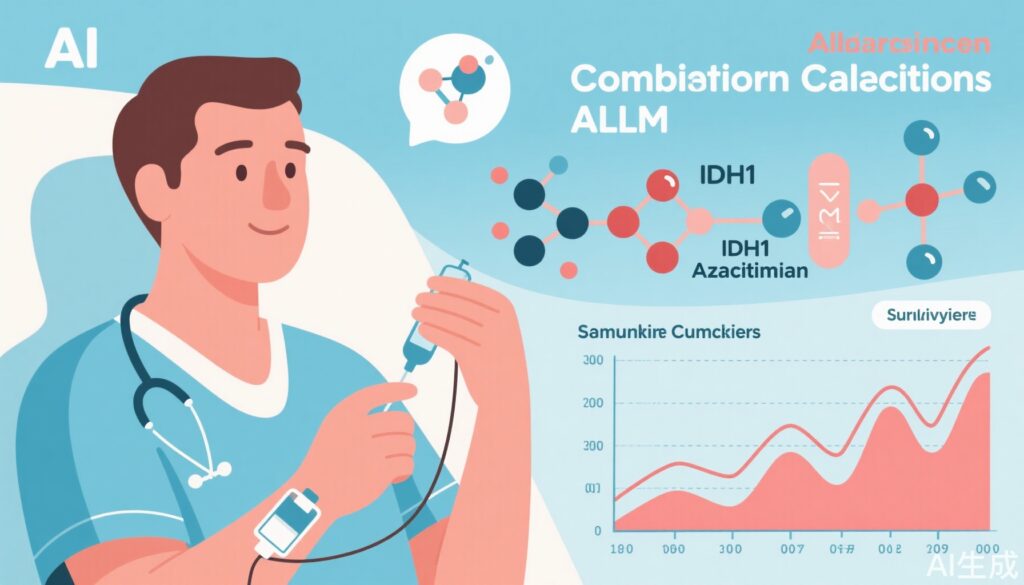Highlights
- Ivosidenib plus azacitidine extended median overall survival (OS) to 29.3 months versus 7.9 months with placebo plus azacitidine in newly diagnosed IDH1-mutated AML patients unfit for intensive chemotherapy.
- The combination regimen led to a transfusion independence rate of 53.8% compared to 17.1% with placebo.
- Lower rates of febrile neutropenia and infections were observed, though neutropenia and bleeding events increased with ivosidenib-azacitidine.
- These results support the combination as a new standard of care in this population, offering the longest OS reported to date.
Clinical Background and Disease Burden
Acute myeloid leukemia (AML) is a heterogeneous hematologic malignancy with a high disease burden and poor prognosis, especially in older adults or those with comorbidities precluding intensive chemotherapy. Among molecular subtypes, isocitrate dehydrogenase 1 (IDH1) mutations account for approximately 6–10% of AML cases. These mutations confer distinct biology, characterized by production of the oncometabolite 2-hydroxyglutarate, which impairs cellular differentiation and contributes to leukemogenesis. Until recently, treatment options for patients with newly diagnosed IDH1-mutated AML unable to tolerate intensive regimens were limited, with hypomethylating agents such as azacitidine offering only modest survival benefit. The need for more effective, well-tolerated therapies in this population remains a critical unmet medical need.
Research Methodology
The AGILE trial was a randomized, double-blind, placebo-controlled phase 3 study evaluating the efficacy and safety of ivosidenib (a selective oral IDH1 inhibitor) in combination with azacitidine in patients aged ≥18 years with newly diagnosed IDH1-mutated AML ineligible for intensive chemotherapy. A total of 148 participants were randomized in a 1:1 ratio to receive either ivosidenib 500 mg orally daily plus azacitidine 75 mg/m² subcutaneously or intravenously on days 1–7 of each 28-day cycle (n = 73), or placebo plus azacitidine (n = 75). Randomization was stratified by geographic region and disease status (de novo vs secondary AML). Key endpoints included overall survival (OS), rate of hematologic recovery, transfusion independence, and molecular measurable residual disease (MRD) response. The median follow-up was 28.6 months, providing a robust assessment of long-term outcomes.
Key Findings
The trial demonstrated a significant and clinically meaningful improvement in OS for the ivosidenib-azacitidine arm, with median OS reaching 29.3 months (95% CI, 13.2–not reached) versus 7.9 months (95% CI, 4.1–11.3) in the placebo-azacitidine group (hazard ratio [HR], 0.42; 95% CI, 0.27–0.65; P < .0001). This represents the longest median OS reported in this patient population to date.
Hematologic recovery was also superior in the combination arm: among patients transfusion-dependent at baseline, 53.8% (21/39) receiving ivosidenib-azacitidine achieved transfusion independence compared to 17.1% (7/41) with placebo-azacitidine (P = .0004). Of the 33 patients in the ivosidenib arm evaluable for MRD, 30.3% (10/33) achieved MRD negativity by day 1 of cycle 14, all in complete remission, suggesting deep molecular responses.
Safety data were consistent with previous reports. The ivosidenib-azacitidine combination was associated with lower rates of febrile neutropenia and infections compared to placebo-azacitidine. However, neutropenia and bleeding events were more common, necessitating vigilant monitoring and supportive care.
Mechanistic Insights and Biological Plausibility
IDH1 mutations in AML result in neomorphic enzyme activity, promoting accumulation of the oncometabolite 2-hydroxyglutarate (2-HG), which disrupts DNA and histone methylation, impairs myeloid differentiation, and drives leukemogenesis. Ivosidenib selectively inhibits mutant IDH1, reducing 2-HG levels and restoring normal cellular function. Azacitidine, a hypomethylating agent, further reverses epigenetic silencing and enhances differentiation. Preclinical data suggest that this combination leads to synergistic anti-leukemic effects, providing a strong rationale for their use together in IDH1-mutated AML.
Expert Commentary
The investigators of the AGILE study conclude: “These long-term efficacy and safety results confirm the benefit of ivosidenib-azacitidine in this challenging-to-treat population and support its use as a standard of care with the longest reported survival benefit for intensive chemotherapy-ineligible patients with IDH1-mutated AML.”
Independent experts echo the significance of these findings, emphasizing that this regimen fills a critical therapeutic gap for older or frail patients and should be considered in national and international guideline updates.
Controversies and Limitations
While the results are compelling, several limitations should be considered. The study was limited to patients unfit for intensive chemotherapy, so generalizability to fitter populations remains uncertain. The sample size, though robust by AML trial standards, may limit subgroup analyses. Increased rates of neutropenia and bleeding highlight the need for individualized risk-benefit assessment. Additionally, long-term follow-up beyond the reported median remains necessary to fully understand late toxicities and durability of response.
Conclusion
The AGILE trial establishes ivosidenib plus azacitidine as an effective and tolerable frontline therapy for newly diagnosed IDH1-mutated AML patients ineligible for intensive chemotherapy. With the longest median OS reported for this population and significant improvements in hematologic recovery and transfusion independence, this novel combination should be strongly considered as a new standard of care. Further research should explore its utility in broader patient populations, long-term outcomes, and potential integration with other targeted or immunotherapeutic strategies.
References
Montesinos P, Marchione DM, Récher C, Heuser M, Vives S, Zarzycka E, Wang J, Riva M, Calado RT, Schuh AC, Yeh SP, Tron AE, Hui J, Gianolio DA, Choe S, Patel PA, De Botton S, DiNardo CD, Döhner H. Long-term results from the AGILE study of azacitidine plus ivosidenib vs placebo in newly diagnosed IDH1-mutated AML. Blood Adv. 2025 Jul 24:bloodadvances.2025016399. doi: 10.1182/bloodadvances.2025016399.



